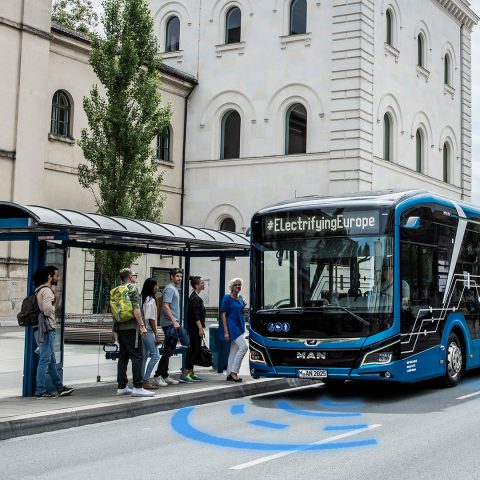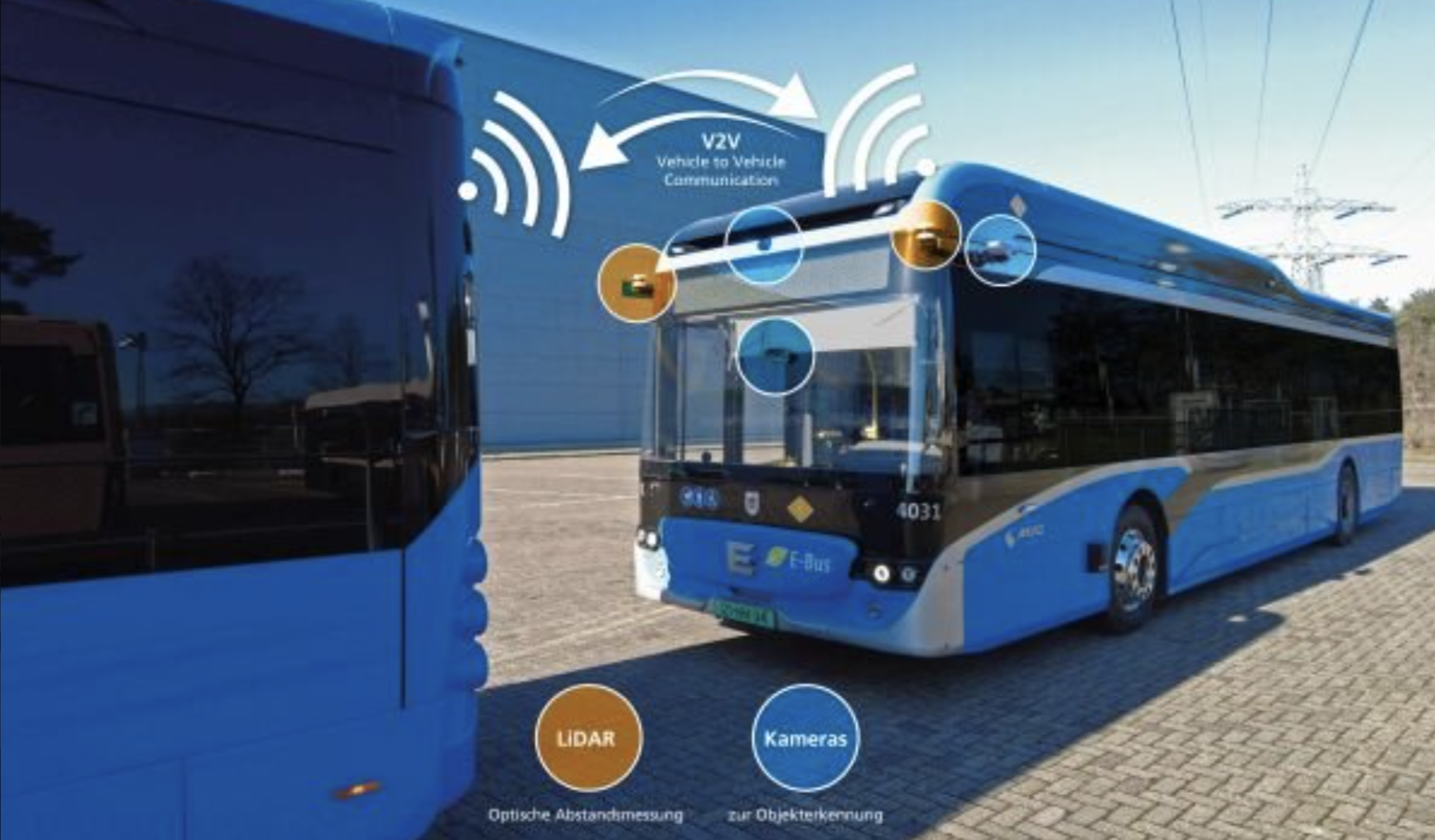Preparations underway for MINGA project in Munich: spotlight on driverless ride-pooling, platooning, autonomous buses
An autonomous on-demand ride-pooling service with three to five vehicles and two automated bus systems, one made of one driverless MAN electric bus (with autonomous technology by Mobileye) and the other operated via two Ebusco 3.0 connected via platooning. These are the ingredients of MINGA project, with preparations underway in Munich. Stadtwerke München (SWM) with […]

An autonomous on-demand ride-pooling service with three to five vehicles and two automated bus systems, one made of one driverless MAN electric bus (with autonomous technology by Mobileye) and the other operated via two Ebusco 3.0 connected via platooning.
These are the ingredients of MINGA project, with preparations underway in Munich. Stadtwerke München (SWM) with Münchner Verkehrsgesellschaft (MVG) is a partner in the project. The preparation with the technical set-up and the clarification of regulatory aspects for the operation of these autonomous services is planned within 2024. Trial operations will start in the course of 2025, and approval for passenger use is targeted by the end of the project period.
MVG and MINGA project: automated vehicles for public transport
MVG and partners in the MINGA project are developing automated vehicles for local public transport.
Together, the partners in the MINGA funding project have set themselves the goal of further developing local public transport. In the project duration of 34 months until the end of 2025, the focus is on the automation of on-demand vehicles and buses. The research project is being funded by the Federal Ministry of Digital Affairs and Transport (BMDV) with around 13 million euros as part of the funding guideline “Autonomous and Connected Driving in Public Transport”.
Teams from research and development, the municipality and the operating company are working together for a holistic investigation from planning to approval and set-up to implementation. The operating area where the vehicles will be tested should offer various traffic challenges and be well connected to a depot.
Ride pooling vehicles still to be tendered
Together with the mobility department of the City of Munich and the DB subsidiary ioki, which offers software solutions for public transport, SWM and MVG are setting up a ride pooling system with three to five automated vehicles in on-demand operation. The procurement of the vehicles for automated on-demand operation in mixed traffic will be put out to public tender in the project.
Michael Barillère-Scholz, co-founder and managing director of the DB technology company ioki: “Autonomous ridepooling is one of the key concepts on the way to a demand-oriented and thus attractive public transport system. In the MINGA project, we will contribute our experience in routing and pooling in local transport as well as our ioki platform and further develop them in close cooperation with the partners. The findings from the project can make a decisive contribution to sustainably influencing local public transport in Germany.”
The preparation of the driving operation is planned in several phases. First, a trial operation without passengers with safety drivers will take place and in the final phase, test runs with passengers under technical supervision are planned in coordination with the licensing authorities.
In addition to the technical implementation, the study will also provide data on driving performance and maintenance in order to be able to optimise processes. In addition, concrete proposals for the design of technical supervision of autonomous vehicles in local public transport will be developed. In this context, a guideline for the industry is also to be developed.
MAN automated bus will be in operation…
SWM is also working with researchers from the University of Stuttgart, the Karlsruhe Institute of Technology (KIT) and the FZI Research Centre for Information Technology as well as the mobility department of the City of Munich to test various systems for scheduled operation with automated buses.
A 12-metre-long electric bus is being equipped with a Self Driving System (SDS) in cooperation with the manufacturer MAN Truck & Bus.
Barbaros Oktay, Head of Bus at MAN Truck & Bus: “Sustainability is a central component of MAN’s corporate strategy. That is why, on the one hand, we are consistently converting our products to electric drives. On the other hand, we are pushing ahead with automation and digitalisation. The MINGA project is an important step for us on the way to the mobility turnaround.”
…with Ebusco in charge of bus platoons
The manufacturer Ebusco is a partner in the project for the development of two bus platoons. This involves forming a formation of two buses connected by a virtual drawbar. The rear bus automatically follows the first vehicle. This makes it possible to offer high-capacity opportunities in bus transport, which can then also replace diesel-powered buses with trailers, still used in Munich.

Wolfgang Hackauf, Sales Director Germany at Ebusco: “Founded ten years ago with the firm conviction that the future belongs to electric transport, innovation is in our DNA. Already years ago, we delivered our first electric buses to SWM, which are still on the road in the city of Munich today. We are proud to now jointly take the next leap into the future of electric driving as part of the MINGA project. We believe that platooning will be another step towards flexibility, efficiency and cost reduction and look forward to further testing these ‘bus platoons’ on German roads with our innovative and lightweight Ebusco 3.0.”
MVG view on the future of public transport
Ingo Wortmann, SWM Managing Director Mobility and MVG CEO: “We are proud to be able to advance the automation of public transport as a partner in the MINGA project and to set standards for the industry. In this way, we are making public transport more attractive for our passengers and creating the basis for further automation and for flexible new services. Our activities for MINGA are thus also an essential building block for our corporate strategy, with which we will make public transport in Munich fit for the future. We can thus establish an on-demand service that complements the underground, bus and tram in the best possible way. MVG is prepared for this – we have already integrated appropriate workstations for this in our new control centre. Another essential aspect is a medium-term replacement for our high-capacity, diesel-powered buses with trailers, which are difficult to electrify in this form, in order to be able to operate our bus fleet completely electrically by 2035. This is possible with two virtually connected solo buses, the so-called bus platoons. A third important sub-project involves an automated solo bus that can operate driverless in the future. Overall, MINGA is another important step for us towards the public transport of the future.”







